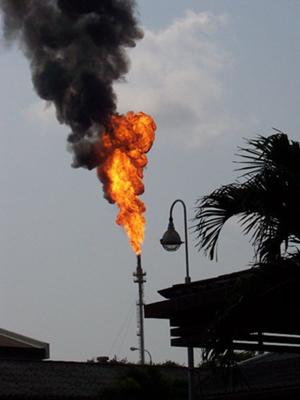increasing air pollution
by prashant
(kaylan, india)
How we can control air pollution?
What is the response for increasing air pollutionBarry's Response - Prashant:
Generally speaking, air pollution is a by-product of some other activity.
People and industries create it while transforming natural materials into products usable by the public. A big part of reducing it is through research, finding alternate methods of producing things to fill the same demand (including transportation) in a less polluting way. This is a long term process, requires initiative and great investment by many people and does not always appear worthwhile from the outset. Therefore we have increasing air pollution problems.
To improve these conditions, we usually determine what problems exist. Where does the pollution have its greatest impact? what is it composed of? What could be possible causes in that specific geographical area? Testing and monitoring provide data which leads to insights and answers.
If we can identify specific sources of air pollution, dispersion modelling helps us determine which of these has the greatest impact when there is more than one, what potential benefits we can gain from modifying any individual source (such as moving the release point) and whether it's worth it to change anything.
If changes are made, it's a good idea to follow up with further monitoring to see if the planned effects have actually taken place.
Here is some supplemental information: In factories, air pollution equipment doesn't work well because of poor design and maintenance, but this expert shows how smart modifications and proper operations can clean factory air, which he says is great for controlling climate change and even boosting profits. See controlairpollution.com/
Also, COPD is a chronic, progressive lung disease, like Emphysema (damaged air sacs) and Chronic Bronchitis (inflamed, mucus-filled airways), most often caused by smoking and diagnosed using a breathing test called spirometry. It essentially makes it feel like you can't get enough air, and while there’s no cure, quitting smoking and using treatments like inhalers and oxygen can help you manage symptoms and live a better life. It's a chronic, progressive lung disease, like Emphysema (damaged air sacs) and Chronic Bronchitis (inflamed, mucus-filled airways), usually caused by smoking. See https://www.webmd.com/lung/news/20001213/deaths-increase-with-air-pollution#1
Search this site for more information now.
A source of air pollution
Most people think of smokestacks or traffic jams when they hear about air pollution. Yes, but it's incomplete. It's possible for a river to be a chimney too. Whenever a green slick of algae fizzes out ammonia and hydrogen sulfide, you're inhaling the aftertaste of aquatic decay. This is meteorology's little prank: the atmosphere doesn't care if the pollutant came from soil, water, or tailpipes. As soon as it gets airborne, it becomes our collective breath.It's called volatilization, aerosolization, secondary chemistry. Microdroplets are flung up by breaking waves, carrying pesticides and heavy metals. Blooms are sparked by nutrients, which exhale strange gases. Often, wastewater plants blow invisible vapors that cause smog downwind, even though they're supposed to protect us. The waste stream of one person triggers the asthma of another.
However, mainstream climate talk focuses on one villain:
Carbon dioxide
Yes, it's important, but it's not the only one. Shakespeare gave us "Something is rotten in the state of Denmark," maybe we should add "Something is volatilizing in the state of Lake Erie."Picture this: a polluted pond, arrows rising to show gases entering the boundary layer, carried by wind into a town nearby. You can increase or reduce industrial discharge and watch ozone levels spike or fall. Suddenly, environmental science isn't just abstract regulation, but a living, breathing thing.
(Often conservatives, farmers, industry voices) say regulations already go too far. Natural events like fires, volcanoes, and the nitrogen cycle themselves dwarf human emissions. They're right about magnitudes, too: the Earth burps methane regardless. Ethics and stewardship tell us something different: we should care for what we control. It means admitting both truths - that natural cycles are vast, and that human responsibility is real.What's the next frontier?Maybe we should stop thinking about pollution in silos - air, water, soil - and start treating them all as one. Maybe consulting firms bring in artists along with scientists so a sketch or poem can stir the conscience just as much as a regulatory table. School kids could wear VR goggles so they can "walk through" air dispersion plumes or ride the wind of a sulfur cloud.
The real danger isn't pollution itself, it's boredom. People stop listening to clean air if it's just compliance. People lean in if clean air is pitched as adventure, as art, as stewardship of God's garden.
What's the strangest, most overlooked source of air pollution? Burping algae? Barns of cows? Is that your grandmother's woodstove? Let's see if we can surprise each other as much as the atmosphere does.
Comments for increasing air pollution
|
||
|
||
Do you have concerns about air pollution in your area??
Perhaps modelling air pollution will provide the answers to your question.
That is what I do on a full-time basis. Find out if it is necessary for your project.
Have your Say...
on the StuffintheAir facebook page
Other topics listed in these guides:
The Stuff-in-the-Air Site Map
And,
Thank you to my research and writing assistants, ChatGPT and WordTune, as well as Wombo and others for the images.
OpenAI's large-scale language generation model (and others provided by Google and Meta), helped generate this text. As soon as draft language is generated, the author reviews, edits, and revises it to their own liking and is responsible for the content.




